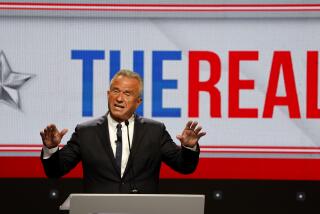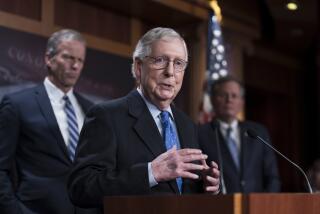Bradley Tries to Regain Balance After Missteps
- Share via
MUSCATINE, Iowa — Renewed questions about Bill Bradley’s health are just the latest tribulation for a campaign that has stumbled through a month of miscues, lengthening the odds that the Democratic underdog can catch a reinvigorated Al Gore.
As Bradley set off Friday on a bus trek across the snowy Iowa countryside, his mood was upbeat and he seemed more focused than in recent weeks. But he also carried a collection of baggage ranging from poor poll numbers to fallout from recent attacks on Gore, which only scuffed up the insurgent’s image as an unconventional candidate.
“There was something charming about Bill Bradley. Part of that was he was not a typical politician, attacking,” said Fred Yang, a Democratic pollster who hasn’t taken sides in the primary fight. Once Bradley began assailing his rival, “Bradley wasn’t Bradley anymore,” said Yang.
Candidate Put on the Defensive
More than any candidate running this election year, the former New Jersey senator has capitalized on his air of authenticity, the sense that he has been more candid and less calculating than most politicians. That honest image helps explain the reaction to revelations that he recently suffered four additional bouts of an irregular heartbeat, disclosed only after he was put on the spot by a reporter.
On Friday, he was forced to defend his failure to disclose those episodes, which seemed relevant, considering he was forced to cancel a brief part of his schedule last month because of a flare-up of his heart condition, atrial fibrillation, which affects about 2 million Americans.
“Am I supposed to say, ‘Well, it’s out. It’s back in. It’s out for two hours, now it’s back in?’ ” Bradley said to reporters, minimizing the condition that he treats with daily doses of medication. He blamed the recent spate of episodes on his consumption of caffeinated cream soda. On Friday night, the campaign released a statement from Bradley’s physician advising him to continue all normal activities without limitation.
Despite the diagnosis, the revelations consumed much of the campaign coverage Friday and fell at a particularly bad time for Bradley, who could very much use a boost from Monday’s Iowa caucuses to carry him into the make-or-break New Hampshire primary eight days later. Polls show him now trailing in both states, and slipping in New York and Massachusetts as well.
“I’m not sure how it will play with voters,” Stuart Rothenberg, an independent political analyst, said of the renewed focus on Bradley’s health. “But we’re 48 hours from the caucuses and Bill Bradley’s message isn’t being driven by Bill Bradley. It’s being driven by his pulse and his heartbeat, and that can’t be good for his campaign.”
Bradley Tries to Reassure Voters
When his heart condition came up as the very first question at a forum Friday morning in Muscatine, the candidate confidently assured his questioner, “It has absolutely no affect on my ability to dispose of the responsibilities of the job if I were successful. You should feel reassured on that front.”
Ironically, despite his recent woes, Bradley has improved his stump performance considerably. The shift seemed to come Wednesday, in New Hampshire. He was moved to tears by a mother’s account of her struggle to provide her child adequate health care. Upon his return to Iowa, Bradley seemed recharged, more confident in his message. At every stop, he has told the story of the New Hampshire woman, declaring, “That shouldn’t happen in America.”
Hearing the woman’s account was “a centering experience,” Bradley told reporters. “It was clearly a moment . . . that reminded me at a very deep level as to why I’m doing what I’m doing. Sometimes you get caught up in the rat-a-tat-tat of things, and [this incident] reaffirmed those values and convictions I have about becoming a politician in the first place.”
Still, for a candidate who seemed charmed for much of the last year--winning glowing press reviews, raking in piles of money, forcing Gore to retool everything from his campaign staff to his wardrobe--little seems to have gone well for Bradley of late.
In a debate earlier this month, he came across as cold when discussing the floods that ravaged Iowa in 1993 and seemed ill-prepared to discuss the agriculture issues that still matter a good deal in this state, even as its economy diversifies.
Many see that debate performance as a turning point in the Democratic primary.
Bradley himself seemed to be in a funk in the weeks that followed. He often seemed distracted in campaign appearances, stumbling over standard lines in his stump speech.
A Shift in Campaign Tactics
A senior Gore advisor suggested, “After the farm debate, people who were up in the air came away thinking here is a guy who couldn’t address the biggest issue in the state in 20 years. That became a handle for other concerns.”
Of course, that assessment is obviously biased. But Rothenberg and other neutral observers suggest Bradley’s diffident performance in several debates helped turn what was once seen as an asset--his cool, above-the-fray mien--into a detriment.
“After a while, it began to strike people as being almost uninterested and detached, not really caring about connecting with people,” Rothenberg said. “It was almost like, ‘I’m so much smarter than everybody else.’ ”
At the same, there was an evident shift in Bradley’s campaign tactics, as he launched the sort of negative attacks he had consciously--and conspicuously--shunned. Just hours after insisting the campaign was about the future and not the past, he reached back 15 years to attack Gore for an old Senate vote on tobacco taxes.
Then, days later, Bradley blamed Gore for injecting the Willie Horton case into the 1988 presidential campaign when Gore first sought the White House. Horton, an African American, was a convicted murderer who raped a woman while on a weekend prison furlough.
Although Gore first cited the case in a primary debate with rival Michael S. Dukakis, the Republicans used Horton to bludgeon Dukakis in the general election.
In both instances, the attacks backfired on Bradley, who quickly abandoned them.
“Bradley’s conundrum has been that if you are going to run as a non-politician, the second you begin acting like a politician the fundamental predicate of your campaign unravels,” the Gore strategist asserted.
At the same time, in the strange way politics works, Bradley’s recent run of misfortunes does carry an upside: by tamping down expectations for his performance in New Hampshire, where the insurgent has staked virtually his entire campaign.
“Whereas a month ago a one-point win in New Hampshire probably would not have been perceived as a win, right now a one-point win in New Hampshire is a win for Bradley,” said Roy Behr, another Democratic strategist who is neutral in the contest. “And a one-point win in New Hampshire--or even better--is still very much within Bradley’s reach.”
*
Times staff writer James Gerstenzang contributed to this story.
More to Read
Get the L.A. Times Politics newsletter
Deeply reported insights into legislation, politics and policy from Sacramento, Washington and beyond. In your inbox three times per week.
You may occasionally receive promotional content from the Los Angeles Times.











